formerly eScholarship Editions


|
|
|
|
Your request for similar items found 20 book(s). | Modify Search | Displaying 1 - 20 of 20 book(s) | |
| 1. | 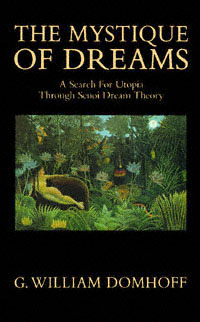 | Title: The mystique of dreams: a search for utopia through Senoi dream theory Author: Domhoff, G. William Published: University of California Press, 1990 Subjects: Sociology | Psychology | Anthropology Publisher's Description: A fascinating strand of the human potential movement of the 1960s involved the dream mystique of a previously unknown Malaysian tribe, the Senoi, first brought to the attention of the Western world by adventurer-anthropologist-psychologist Kilton Stewart. Exploring the origin, attraction, and efficacy of the Senoi ideas, G. William Domhoff also investigates current research on dreams and concludes that the story of Senoi dream theory tells us more about certain aspects of American culture than it does about this distant tribe. In analyzing its mystical appeal, he comes to some unexpected conclusions about American spirituality and practicality. [brief] Similar Items |
| 2. | 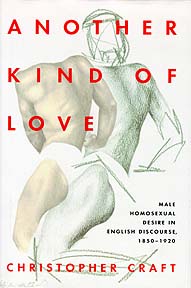 | Title: Another kind of love: male homosexual desire in English discourse, 1850-1920 Author: Craft, Christopher 1952- Published: University of California Press, 1994 Subjects: Literature | Sociology | Literary Theory and Criticism | Gender Studies | GayLesbian and Bisexual Studies Publisher's Description: In a study that will be of interest to all those concerned with the politics of gender, the history of sexuality, and the erotics of reading, Christopher Craft investigates questions fundamental to any history of present sexualities. How does the modern binary homosexual/heterosexual relate to earlier formulations like "sexual inversion" and "sodomy"? What part does literature play in the development of such categories, or in a culture's resistance to them? And what are the implications for the creation and maintenance of the presumed "natural" male heterosexual subject? How has male heterosexual subjectivity been established as a bulwark against the attractions of a homosexual desire that is repeatedly incited by the very culture that condemns it?Craft examines the discourses of nineteenth-century psychiatry and sexology; some of Freud's central writings; and Tennyson's In Memoriam , Wilde's The Importance of Being Earnest , Stoker's Dracula , and Lawrence's Women In Love . [brief] Similar Items |
| 3. | 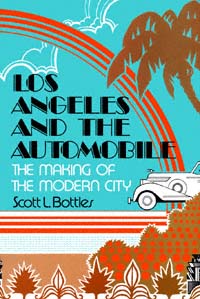 | Title: Los Angeles and the automobile: the making of the modern city Author: Bottles, Scott L Published: University of California Press, 1987 Subjects: American Studies | Californian and Western History | Urban Studies | United States History | American Studies Publisher's Description: More comprehensive than any other book on this topic, Los Angeles and the Automobile places the evolution of Los Angeles within the context of American political and urban history. Similar Items |
| 4. | 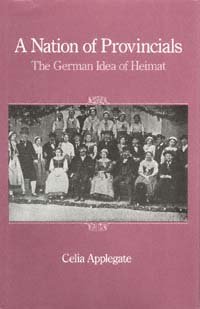 | Title: A nation of provincials: the German idea of Heimat Author: Applegate, Celia Published: University of California Press, 1990 Subjects: History | European History | German Studies Publisher's Description: At the center of this pioneering work in modern European history is the German word Heimat - the homeland, the local place. Translations barely penetrate the meaning of the word, which has provided the emotional and ideological common ground for a variety of associations and individuals devoted to the cause of local preservation. Celia Applegate examines at both the national and regional levels the cultural meaning of Heimat and why it may be pivotal to the troubled and very timely question of German identity.The ideas and activities clustered around Heimat shed new light particularly on problems of modernization. Instead of viewing the Germans as a dangerously anti-modern people, Applegate argues that they used the cultivation of Heimat to ground an abstract nationalism in their attachment to familiar places and to reconcile the modern industrial and urban world with the rural landscapes and customs they admired. Primarily a characteristic of the middle classes, love of Heimat constituted an alternative vision of German unity to the familiar aggressive, militaristic one. The Heimat vision of Germany emphasized cultural diversity and defined German identity by its internal members rather than its external enemies.Applegate asks that we re-examine the continuities of German history from the perspective of the local places that made up Germany, rather than from that of prominent intellectuals or national policymakers. The local patriotism of Heimat activists emerges as an element of German culture that persisted across the great divides of 1918, 1933, and 1945. She also suggests that this attachment to a particular place is a feature of Europeans in general and is deserving of further attention. [brief] Similar Items |
| 5. |  | Title: Jazz, rock, and rebels: cold war politics and American culture in a divided Germany Author: Poiger, Uta G 1965- Published: University of California Press, 2000 Subjects: German Studies | Cultural Anthropology | European History | United States History | American Music | Jazz | Gender Studies | American Studies Publisher's Description: In the two decades after World War II, Germans on both sides of the iron curtain fought vehemently over American cultural imports. Uta G. Poiger traces how westerns, jeans, jazz, rock 'n' roll, and stars like Marlon Brando or Elvis Presley reached adolescents in both Germanies, who eagerly adopted the new styles. Poiger reveals that East and West German authorities deployed gender and racial norms to contain Americanized youth cultures in their own territories and to carry on the ideological Cold War battle with each other. Poiger's lively account is based on an impressive array of sources, ranging from films, newspapers, and contemporary sociological studies, to German and U.S. archival materials. Jazz, Rock, and Rebels examines diverging responses to American culture in East and West Germany by linking these to changes in social science research, political cultures, state institutions, and international alliance systems. In the first two decades of the Cold War, consumer culture became a way to delineate the boundaries between East and West. This pathbreaking study, the first comparative cultural history of the two Germanies, sheds new light on the legacy of Weimar and National Socialism, on gender and race relations in Europe, and on Americanization and the Cold War. [brief] Similar Items |
| 6. | 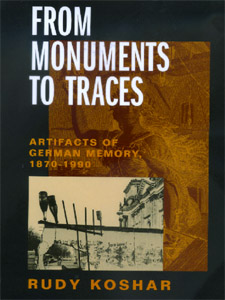 | Title: From monuments to traces: artifacts of German memory, 1870-1990 Author: Koshar, Rudy Published: University of California Press, 2000 Subjects: German Studies | History | Architectural History | European History Publisher's Description: Rudy Koshar constructs a powerful framework in which to examine the subject of German collective memory, which for more than a half century has been shaped by the experience of Nazism, World War II, and the Holocaust. Finding the assumptions of many writers and scholars shortsighted, Koshar surveys the evidence of postwar German memory in the context of previous traditions. From Monuments to Traces follows the evolution of German "memory landscapes" all the way from national unification in 1870-71 through the world wars and political division to reunification in 1990. The memory landscapes of any society may incorporate monuments, historical buildings, memorials and cemeteries, battlefields, streets, or natural environments that foster shared memories of important events or personalities. They may also be designed to divert public attention from embarrassing or traumatic histories. Koshar argues that in Germany, memory landscapes have taken shape according to four separate paradigms--the national monument, the ruin, the reconstruction, and the trace--which he analyzes in relation to the changing political agendas that have guided them over time. Despite the massive ruptures of Germany's history, we see that significant continuities have served to counterbalance the traumas of the German past. [brief] Similar Items |
| 7. | 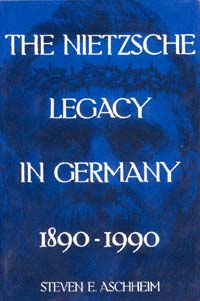 | Title: The Nietzsche legacy in Germany, 1890-1990 Author: Aschheim, Steven E 1942- Published: University of California Press, 1994 Subjects: German Studies | Intellectual History | Social and Political Thought | Politics | German Studies Publisher's Description: Countless attempts have been made to appropriate the ideas of Friedrich Nietzsche for diverse cultural and political ends, but nowhere have these efforts been more sustained and of greater consequence than in Germany. Aschheim offers a magisterial chronicle of the philosopher's presence in German li . . . [more] Similar Items |
| 8. |  | Title: In the shadow of catastrophe: German intellectuals between apocalypse and enlightenment Author: Rabinbach, Anson Published: University of California Press, 1997 Subjects: History | German Studies | Social and Political Thought | Philosophy Publisher's Description: These essays by eminent European intellectual and cultural historian Anson Rabinbach address the writings of key figures in twentieth-century German philosophy. Rabinbach explores their ideas in relation to the two world wars and the horrors facing Europe at that time.Analyzing the work of Benjamin and Bloch, he suggests their indebtedness to the traditions of Jewish messianism. In a discussion of Hugo Ball's little-known Critique of the German Intelligentsia , Rabinbach reveals the curious intellectual career of the Dadaist and antiwar activist turned-nationalist and anti-Semite. His examination of Heidegger's "Letter on Humanism" and Jaspers's The Question of German Guilt illuminates the complex and often obscure political referents of these texts. Turning to Horkheimer and Adorno's Dialectic of Enlightenment , Rabinbach offers an arresting new interpretation of this central text of the critical theory of the Frankfurt School. Subtly and persuasively argued, his book will become an indispensable reference point for all concerned with twentieth-century German history and thought. [brief] Similar Items |
| 9. | 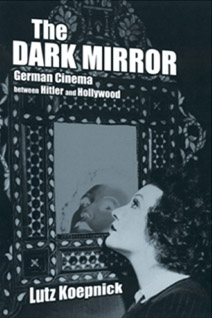 | Title: The dark mirror: German cinema between Hitler and Hollywood Author: Koepnick, Lutz P. (Lutz Peter) Published: University of California Press, 2002 Subjects: Cinema and Performance Arts | German Studies | Music | Film Publisher's Description: Lutz Koepnick analyzes the complicated relationship between two cinemas - Hollywood's and Nazi Germany's - in this theoretically and politically incisive study. The Dark Mirror examines the split course of German popular film from the early 1930s until the mid 1950s, showing how Nazi filmmakers appropriated Hollywood conventions and how German film exiles reworked German cultural material in their efforts to find a working base in the Hollywood studio system. Through detailed readings of specific films, Koepnick provides a vivid sense of the give and take between German and American cinema. [brief] Similar Items |
| 10. | 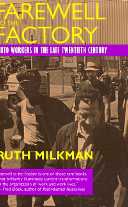 | Title: Farewell to the factory: auto workers in the late twentieth century Author: Milkman, Ruth 1954- Published: University of California Press, 1997 Subjects: Sociology | Politics Publisher's Description: This study exposes the human side of the decline of the U.S. auto industry, tracing the experiences of two key groups of General Motors workers: those who took a cash buyout and left the factory, and those who remained and felt the effects of new technology and other workplace changes. Milkman's extensive interviews and surveys of workers from the Linden, New Jersey, GM plant reveal their profound hatred for the factory regime - a longstanding discontent made worse by the decline of the auto workers' union in the 1980s. One of the leading social historians of the auto industry, Ruth Milkman moves between changes in the wider industry and those in the Linden plant, bringing both a workers' perspective and a historical perspective to the study.Milkman finds that, contrary to the assumption in much of the literature on deindustrialization, the Linden buyout-takers express no nostalgia for the high-paying manufacturing jobs they left behind. Given the chance to make a new start in the late 1980s, they were eager to leave the plant with its authoritarian, prison-like conditions, and few have any regrets about their decision five years later. Despite the fact that the factory was retooled for robotics and that the management hoped to introduce a new participatory system of industrial relations, workers who remained express much less satisfaction with their lives and jobs.Milkman is adamant about allowing the workers to speak for themselves, and their hopes, frustrations, and insights add fresh and powerful perspectives to a debate that is often carried out over the heads of those whose lives are most affected by changes in the industry. [brief] Similar Items |
| 11. |  | Title: Where the world ended: re-unification and identity in the German borderland Author: Berdahl, Daphne 1964- Published: University of California Press, 1999 Subjects: Anthropology | Cultural Anthropology | German Studies | Geography | European Studies | Social Problems Publisher's Description: When the Berlin Wall fell, people who lived along the dismantled border found their lives drastically and rapidly transformed. Daphne Berdahl, through ongoing ethnographic research in a former East German border village, explores the issues of borders and borderland identities that have accompanied the many transitions since 1990. What happens to identity and personhood, she asks, when a political and economic system collapses overnight? How do people negotiate and manipulate a liminal condition created by the disappearance of a significant frame of reference?Berdahl concentrates especially on how these changes have affected certain "border zones" of daily life - including social organization, gender, religion, and nationality - in a place where literal, indeed concrete, borders were until recently a very powerful presence. Borders, she argues, are places of ambiguity as well as of intense lucidity; these qualities may in fact be mutually constitutive. She shows how, in a moment of headlong historical transformation, larger political, economic, and social processes are manifested locally and specifically. In the process of a transition between two German states, people have invented, and to some extent ritualized, cultural practices that both reflect and constitute profound identity transformations in a period of intense social discord. Where the World Ended combines a vivid ethnographic account of everyday life under socialist rule and after German reunification with an original investigation of the paradoxical human condition of a borderland. [brief] Similar Items |
| 12. | 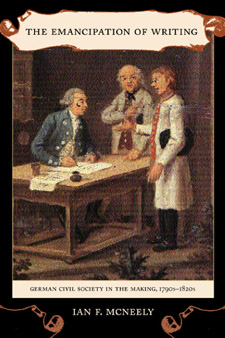 | Title: The emancipation of writing: German civil society in the making, 1790s-1820s Author: McNeely, Ian F 1971- Published: University of California Press, 2003 Subjects: History | European Studies | German Studies | European History | Sociology | Political Theory | Anthropology Publisher's Description: The Emancipation of Writing is the first study of writing in its connection to bureaucracy, citizenship, and the state in Germany. Stitching together micro- and macro-level analysis, it reconstructs the vibrant, textually saturated civic culture of the German southwest in the aftermath of the French Revolution and Napoleon's invasions. Ian F. McNeely reveals that Germany's notoriously oppressive bureaucracy, when viewed through the writing practices that were its lifeblood, could also function as a site of citizenship. Citizens, acting under the mediation of powerful local scribes, practiced their freedoms in written engagements with the state. Their communications laid the basis for civil society, showing how social networks commonly associated with the free market, the free press, and the voluntary association could also take root in powerful state institutions. [brief] Similar Items |
| 13. | 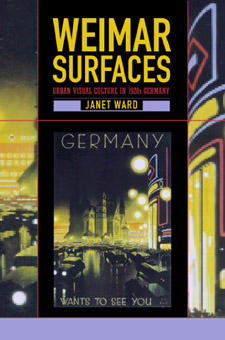 | Title: Weimar surfaces: urban visual culture in 1920s Germany Author: Ward, Janet 1963- Published: University of California Press, 2001 Subjects: Literature | Architecture | Film | European Studies | European History | Popular Culture Publisher's Description: Germany of the 1920s offers a stunning moment in modernity, a time when surface values first became determinants of taste, activity, and occupation: modernity was still modern, spectacle was still spectacular. Janet Ward's luminous study revisits Weimar Germany via the lens of metropolitan visual cu . . . [more] Similar Items |
| 14. | 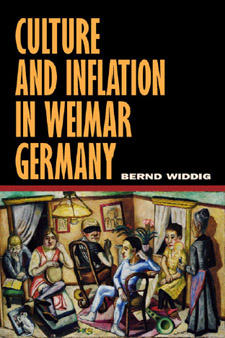 | Title: Culture and inflation in Weimar Germany Author: Widdig, Bernd Published: University of California Press, 2001 Subjects: German Studies | European History | Intellectual History | European Literature Publisher's Description: For many Germans the hyperinflation of 1922 to 1923 was one of the most decisive experiences of the twentieth century. In his original and authoritative study, Bernd Widdig investigates the effects of that inflation on German culture during the Weimar Republic. He argues that inflation, with its dyn . . . [more] Similar Items |
| 15. | 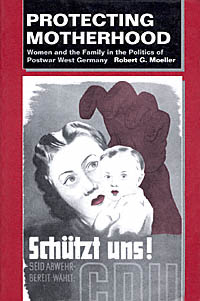 | Title: Protecting motherhood: Women and the family in the politics of postwar West Germany Author: Moeller, Robert G Published: University of California Press, 1993 Subjects: History | European History | Women's Studies | German Studies Publisher's Description: Robert G. Moeller is the first historian of modern German women to use social policy as a lens to focus on society's conceptions of gender difference and "woman's place." He investigates the social, economic, and political status of women in West Germany after World War II to reveal how the West Germans, emerging from the rubble of the Third Reich, viewed a reconsideration of gender relations as an essential part of social reconstruction.The debate over "woman's place" in the fifties was part of West Germany's confrontation with the ideological legacy of National Socialism. At the same time, the presence of the Cold War influenced all debates about women and the family. In response to the "woman question," West Germans defined the boundaries not only between women and men, but also between East and West.Moeller's study shows that public policy is a crucial arena where women's needs, capacities, and possibilities are discussed, identified, defined, and reinforced. Nowhere more explicitly than in the first decade of West Germany's history did, in Joan Scott's words, "politics construct gender and gender construct politics." [brief] Similar Items |
| 16. | 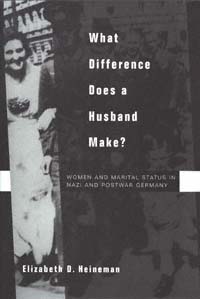 | Title: What difference does a husband make?: women and marital status in Nazi and postwar Germany Author: Heineman, Elizabeth D 1962- Published: University of California Press, 1999 Subjects: History | German Studies | Women's Studies | Sociology Publisher's Description: In October 1946, seven million more women than men lived in occupied Germany. In this study of unwed, divorced, widowed, and married women at work and at home across three political regimes, Elizabeth Heineman traces the transitions from early National Socialism through the war and on to the consolidation of democracy in the West and communism in the East.Based on thorough and extensive research in German national and regional archives as well as the archives of the U.S. occupying forces, this pathbreaking book argues that marital status can define women's position and experience as surely as race, gender, sexual orientation, and class. Heineman finds that, while the war made the experience of single women a dramatic one, state activity was equally important. As a result, West German women continued to be defined in large part by their marital status. In contrast, by the time of reunification marital status had become far less significant in the lives of East German women.In one broad, comprehensive sweep, Elizabeth Heineman compares prewar and postwar, East and West, lived experience and public policy. Her sharp analytical insights will enrich our understanding of the history of women in modern Germany and the role of marital status in twentieth-century life worldwide. [brief] Similar Items |
| 17. | 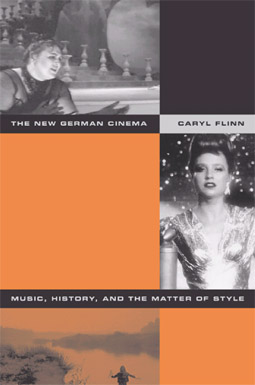 | Title: The new German cinema: music, history, and the matter of style Author: Flinn, Caryl Published: University of California Press, 2003 Subjects: Cinema and Performance Arts | German Studies | Music Publisher's Description: When New German cinema directors like R. W. Fassbinder, Ulrike Ottinger, and Werner Schroeter explored issues of identity - national, political, personal, and sexual - music and film style played crucial roles. Most studies of the celebrated film movement, however, have sidestepped the role of music, a curious oversight given its importance to German culture and nation formation. Caryl Flinn's study reverses this trend, identifying styles of historical remembrance in which music participates. Flinn concentrates on those styles that urge listeners to interact with difference - including that embodied in Germany's difficult history - rather than to "master" or "get past" it. Flinn breaks new ground by considering contemporary reception frameworks of the New German Cinema, a generation after its end. She discusses transnational, cultural, and historical contexts as well as the sexual, ethnic, national, and historical diversity of audiences. Through detailed case studies, she shows how music helps filmgoers engage with a range of historical subjects and experiences. Each chapter of The New German Cinema examines a particular stylistic strategy, assessing music's role in each. The study also examines queer strategies like kitsch and camp and explores the movement's charged construction of human bodies on which issues of ruination, survival, memory, and pleasure are played out. [brief] Similar Items |
| 18. |  | Title: Representation and its discontents: the critical legacy of German romanticism Author: Seyhan, Azade Published: University of California Press, 1992 Subjects: Philosophy | Literary Theory and Criticism | German Studies Publisher's Description: Azade Seyhan provides a concise, elegantly argued introduction to the critical theory of German Romanticism and demonstrates how its approach to the metaphorical and linguistic nature of knowledge is very much alive in contemporary philosophy and literary theory. Her analysis of key thinkers such as Friedrich Schlegel and Novalis explores their views on rhetoric, systematicity, hermeneutics, and cultural interpretation. Seyhan examines German Romanticism as a critical intervention in the debates on representation, which developed in response to the philosophical revolution of German Idealism.Facing a chaotic political and intellectual landscape, the eighteenth-century theorists sought new models of understanding and new objectives for criticism and philosophy. Representation and Its Discontents identifies the legacy of this formative moment in modern criticism and suggests its relevance to contemporary discussions of post-structuralism, orientalism, theories of textuality, and the nature of philosophical discourse. [brief] Similar Items |
| 19. | 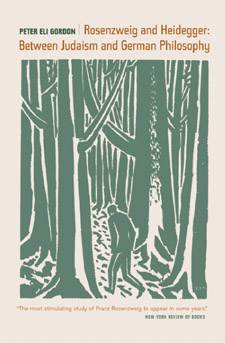 | Title: Rosenzweig and Heidegger: between Judaism and German philosophy Author: Gordon, Peter Eli Published: University of California Press, 2003 Subjects: History | German Studies | Religion | Judaism | European History | Intellectual History | Jewish Studies | Social and Political Thought Publisher's Description: Franz Rosenzweig (1886-1929) is widely regarded today as one of the most original and intellectually challenging figures within the so-called renaissance of German-Jewish thought in the Weimar period. The architect of a unique kind of existential theology, and an important influence upon such philosophers as Walter Benjamin, Martin Buber, Leo Strauss, and Emmanuel Levinas, Rosenzweig is remembered chiefly as a "Jewish thinker," often to the neglect of his broader philosophical concerns. Cutting across the artificial divide that the traumatic memory of National Socialism has drawn between German and Jewish philosophy, this book seeks to restore Rosenzweig's thought to the German philosophical horizon in which it first took shape. It is the first English-language study to explore Rosenzweig's enduring debt to Hegel's political theory, neo-Kantianism, and life-philosophy; the book also provides a new, systematic reading of Rosenzweig's major work, The Star of Redemption. Most of all, the book sets out to explore a surprising but deep affinity between Rosenzweig's thought and that of his contemporary, the German philosopher Martin Heidegger. Resisting both apologetics and condemnation, Gordon suggests that Heidegger's engagement with Nazism should not obscure the profound and intellectually compelling bond in the once-shared tradition of modern German and Jewish thought. A remarkably lucid discussion of two notably difficult thinkers, this book represents an eloquent attempt to bridge the forced distinction between modern Jewish thought and the history of modern German philosophy - and to show that such a distinction cannot be sustained without doing violence to both. [brief] Similar Items |
| 20. | 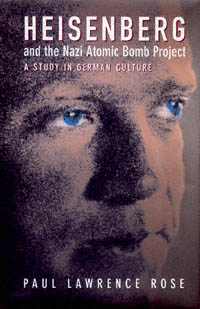 | Title: Heisenberg and the Nazi atomic bomb project: a study in German culture Author: Rose, Paul Lawrence Published: University of California Press, 1998 Subjects: History | European History | German Studies | European Studies | Science | Technology and Society | Physics | History and Philosophy of Science Publisher's Description: No one better represents the plight and the conduct of German intellectuals under Hitler than Werner Heisenberg, whose task it was to build an atomic bomb for Nazi Germany. The controversy surrounding Heisenberg still rages, because of the nature of his work and the regime for which it was undertaken. What precisely did Heisenberg know about the physics of the atomic bomb? How deep was his loyalty to the German government during the Third Reich? Assuming that he had been able to build a bomb, would he have been willing? These questions, the moral and the scientific, are answered by Paul Lawrence Rose with greater accuracy and breadth of documentation than any other historian has yet achieved.Digging deep into the archival record among formerly secret technical reports, Rose establishes that Heisenberg never overcame certain misconceptions about nuclear fission, and as a result the German leaders never pushed for atomic weapons. In fact, Heisenberg never had to face the moral problem of whether he should design a bomb for the Nazi regime. Only when he and his colleagues were interned in England and heard about Hiroshima did Heisenberg realize that his calculations were wrong. He began at once to construct an image of himself as a "pure" scientist who could have built a bomb but chose to work on reactor design instead. This was fiction, as Rose demonstrates: in reality, Heisenberg blindly supported and justified the cause of German victory. The question of why he did, and why he misrepresented himself afterwards, is answered through Rose's subtle analysis of German mentality and the scientists' problems of delusion and self-delusion. This fascinating study is a profound effort to understand one of the twentieth century's great enigmas. [brief] Similar Items |